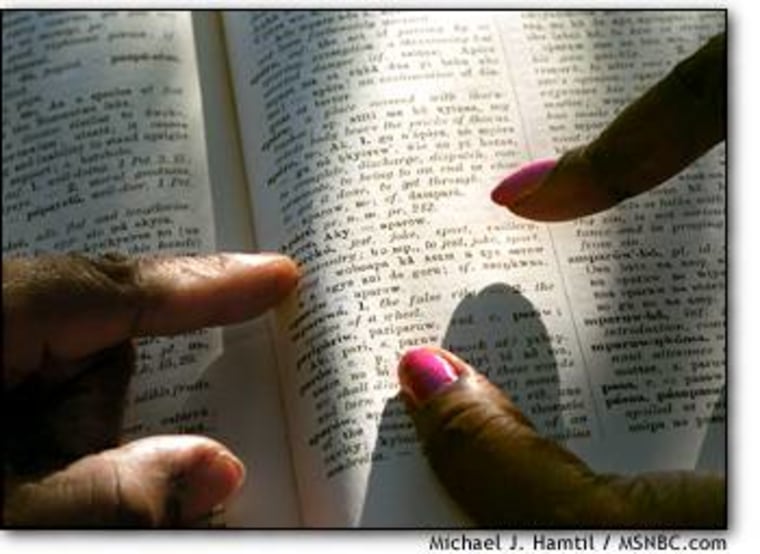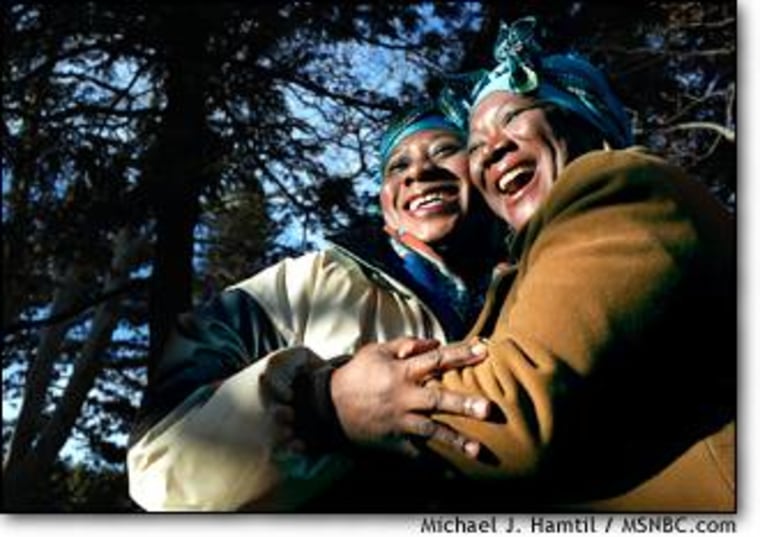Twenty-five years after Alex Haley’s “Roots” showed blacks that they could trace their family stories backward beyond slavery, another African-American author is using genetics to take the saga to the next level: Pearl Duncan has combined extensive DNA testing with years of research to trace her lineage back to Ghana — without ever setting foot in the country.
“I would not have been able to do it in any other time in history,” says Duncan, a travel writer and former college professor who is writing a book about her quest, titled “DNA Dawns Bringing Daylight.”
The search for roots poses special challenges for African-Americans, whose native cultures and languages were often blotted out by generations of slavery and racism in the New World. Individuals like Duncan and research efforts like the African Burial Ground Project and African Ancestry are using genetic analysis to make the connection to long-sundered cousins on the mother continent.
A way with words
For Duncan, 51, the DNA connection is only the latest chapter in a decades-long story.
The tale took root when she was a little girl in New York, listening to the linguistic twists of her Jamaican-born parents: If she started making a mess, she was told not to “chaka-chaka” the room. If she ate too fast, her mother reminded her not to “nyam” her food. Her mother’s nickname was “Dockyi,” her father’s was “Pari.”
The airing of “Roots” in 1977 served only to whet an already-strong appetite for the family quest. “I remember how intertwined the family stories were in ‘Roots,’ but I think that’s something that African-Americans take for granted,” she said.
She learned that her ancestors were Maroons — slaves who were brought from Africa to Jamaica more than 300 years ago, but escaped from their British conquerors and fought to keep their freedom.
When she visited the Caribbean as a travel writer, she saw the places where her ancestors lived, and heard some of the strange words she remembered from her childhood.
Eventually, her curiosity brought her to a linguistic anthropologist at the Smithsonian Institution. He told her the words came from a language spoken by the Akuapim tribe, part of the Akan people in present-day Ghana. “Pari,” for example, was a shortened form of the family surname Opare.
“I said, ‘Well, do the Opares still exist? And he said, ‘Do they exist! I know some of them!’”
That set her on a time-consuming search for Ghanaian immigrants throughout the East Coast, and especially for Opares. “I literally interviewed about 500 Africans,” she said. By 1999, she had found dozens of members of the Opare family — but there was little more to support the link than words and family resemblances.
That’s when genetics played a crucial role.
A way with DNA
In 1999, scientists announced that Y-chromosome tests had turned up a genetic link between southern Africa’s Lemba tribe and the Jewish Cohanim, a priestly clan going back to biblical times. Excited by the news, Duncan contacted researchers at the University of Arizona’s Human Genome Diversity Project and asked if they could run the same tests on her father and the Opares.
“They said they didn’t work with the general public — they needed a whole pool of people,” she recalled. “‘How many do you need?’ I asked. They said a dozen. So I said, ‘Well, I’ll have three dozen for you.’”
The researchers tested the three dozen cheek-swab samples, and in exchange Duncan shared her years of research on African culture and history. When the lab results came back, 30 samples of Y-chromosome DNA from male Opares matched up with Duncan’s father.
“They’re still doing the comparisons,” she said, “because given the information I have, we will actually narrow down the group of Opares to the specific family where the person got on the boat,” four centuries ago.
She already feels as if she’s found family in Vida Opare, a nurse who immigrated from Ghana, and whose family’s DNA matches that of Duncan’s father. “She looks more like me than two of my sisters do,” Duncan said.

A way with wonder
Duncan is planning to take her first trip to Ghana this fall for the traditional harvest festivals, if she can get her book finished. Looking back, she wonders at the complex, four-century saga of her family — from Ghana to Jamaica to America. Strangely enough, the family quest has made her feel more American as well as more African.
“Once you do the research, you say, ‘Wait a minute: These are people who were here before the country became organized,’” she said. “It’s not the narrative that they were victims, that they were beaten, that they were slaves. They were the workers. They were the builders. And that’s a very empowering feeling.”
She believes it’s a message that can be drawn from the saga of the Haleys, the Duncans, the Opares — and many more families.
“As more stories are revealed, we will change the narrative of African-American culture and experience in America. When I was discussing my book with editors before, one editor asked me how I could be writing about how heroic my people were, when they were victims,” said Duncan, who lives just three blocks from the ruins left behind by the Sept. 11 terror attacks on the World Trade Center.
“After 9/11,” she said in an e-mail message, “I think a lot more people in America understand how humans can have traumatic experiences, suffer travesties, and still be heroic.”
